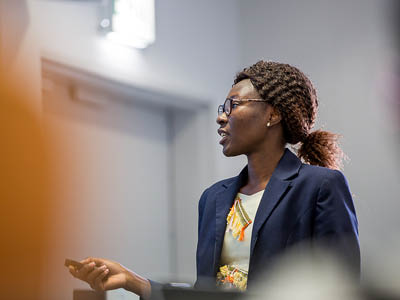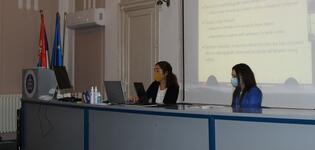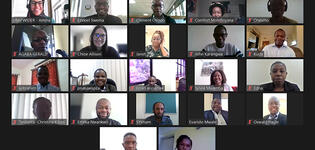Blog
Building skills to influence policy at home and abroad
Learning and growing with UNU-WIDER
UNU-WIDER has featured prominently in my research career to date. It began during my PhD when I visited the Helsinki office as a Visiting PhD Fellow to spend the spring working on my thesis with two wonderful mentors, Carla Canelas and Rachel Gisselquist, before returning to University Cheick Anta Diop in Senegal to defend my thesis.
Then in 2019, while working as a lecturer and researcher at Université Norbert Zongo in Burkina Faso at the Economics and Management Department, I saw an announcement for the UNU-WIDER Summer School. As soon as I read it, I knew it would be an amazing opportunity to deepen my knowledge and to share my experience with other participants. And learn from theirs. Indeed, I came away more confident in my understanding of theories, methods and tools needed to conduct a rigorous quantitative analysis of labour markets in developing countries. I also felt more a part of the UNU-WIDER network, and connected with other researchers from around the Global South with whom I was able to exchange knowledge and experience relevant to my work, and with whom I am already discussing collaboration.
 Beyond my own research, I was able to gain knowledge that is helping me update the courses I teach, and which I am sharing with peers. This is so important because within research you are never working alone. I feel especially when you’re a researcher in the Global South, if you have the opportunity to update your knowledge and/or share skills it can only help, because the more rigorous research that comes out of the Global South the more we will be able to influence policy both on a national and international scale.
Beyond my own research, I was able to gain knowledge that is helping me update the courses I teach, and which I am sharing with peers. This is so important because within research you are never working alone. I feel especially when you’re a researcher in the Global South, if you have the opportunity to update your knowledge and/or share skills it can only help, because the more rigorous research that comes out of the Global South the more we will be able to influence policy both on a national and international scale.
Policy makers in my country often do not trust researchers, particularly in economics. I really want to see this change. I want to see policy makers using researchers’ findings to build their policies and development plans — I truly believe that this is only way we can work towards a world without poverty. I hope that by improving the quality and reputation of research being done within my country policy makers will be more inclined to trust the findings. If they see my work, or my peers’ work, being published in international journals that will help to build their confidence. To do this we need to be able to conduct high-quality research and data analysis, so I am pleased to know that I can be part of this change by using and sharing my skills and expertise.
 The summer school was an important experience for me as a young researcher, and I know some of the other researchers whom I met felt the same The experience allowed us to interact, not just with experts in the field, but also with each other. And having that network means that when we come up against something we don’t understand, or we want to find a different way of looking at something, we can turn to each other for input from people with both similar and different country contexts, who understand labour markets in the Global South.
The summer school was an important experience for me as a young researcher, and I know some of the other researchers whom I met felt the same The experience allowed us to interact, not just with experts in the field, but also with each other. And having that network means that when we come up against something we don’t understand, or we want to find a different way of looking at something, we can turn to each other for input from people with both similar and different country contexts, who understand labour markets in the Global South.
I really hope that the summer school will be run again. I would certainly encourage my peers and students to be part of it because it’s such a great learning experience, and it creates an atmosphere conducive to discussing future opportunities, collaborations, and networking. It is also a chance to become part of the UNU-WIDER network — which provides you with invaluable opportunities to learn and interact with experts. After being part of two learning programmes, and attending and engaging with the network in two conferences, it’s proved to be a valuable asset, I have connections now with people from around the world that I can send questions or papers too. To have that support is just amazing.
Pouirkèta Rita Nikiema is a lecturer and researcher at Université Norbert Zongo, Burkina Faso.
The views expressed in this piece are those of the author(s), and do not necessarily reflect the views of the Institute or the United Nations University, nor the programme/project donors.
 Join the network
Join the network





